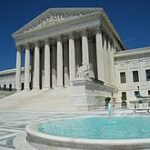In a significant legal development, the Supreme Court handed down a ruling on Monday asserting that states lack the authority to disqualify former President Donald Trump from the ballot due to his alleged role in the January 6, 2021 attacks on the U.S. Capitol. The Court, in an unsigned opinion, underscored that only Congress, not individual states, possesses the prerogative to enforce Section 3 of the 14th Amendment.
This constitutional provision, formulated in the aftermath of the Civil War, empowers Congress to disqualify individuals who had previously served in federal or state government but supported the Confederacy from holding office. All nine justices concurred that Colorado could not bar Trump from the ballot, yet four justices, including Justice Amy Coney Barrett and Justices Sonia Sotomayor, Elena Kagan, and Ketanji Brown Jackson, advocated for a more limited decision, emphasizing that the court should have refrained from addressing additional issues.
Trump currently maintains a substantial lead in the race for the Republican nomination.
This legal dispute originated in a Colorado state court last year, where voters contended that Trump should be ineligible to appear on the ballot under Section 3. The state trial court acknowledged Trump’s alleged engagement in insurrection but rejected the plea to remove him from the ballot, asserting that the presidency does not constitute an “office under the United States.”
The Colorado Supreme Court later concurred that Trump should be disqualified under Section 3 but temporarily halted its ruling to allow Trump to appeal to the Supreme Court. SCOTUS, in a 13-page unsigned opinion, reversed the state supreme court’s decision, emphasizing that Section 3’s enforcement lies within Congress’s purview.
The opinion underscored that states lack the authority to enforce Section 3 against federal candidates:
[P]ermitting state enforcement of Section 3 against federal officeholders and candidates would raise serious questions about the scope of that power.
601 U.S. ____ (2024).
Justice Barrett, in a separate concurring opinion, argued that the court’s holding regarding state enforcement of Section 3 against presidential candidates sufficed for the case and cautioned against delving into the complex question of whether federal legislation exclusively governs Section 3 enforcement.
This ruling not only affects Colorado but also has implications for cases in Maine and Illinois where similar disqualification decisions were put on hold pending the Supreme Court’s decision. It arrives amid the court’s decision to hear another case involving Trump’s alleged conspiracy to overturn the 2020 election results, with a verdict expected by late June or early July.